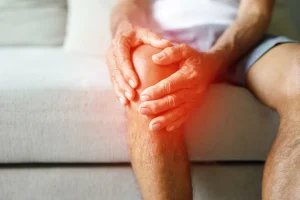What Is Tendonitis?

Tendonitis—also spelled tendinitis—is the inflammation or irritation of a tendon, the thick cord that connects muscle to bone. This condition often results from repetitive activities or overuse, especially in sports or occupations that place frequent strain on a specific affected tendon.
Tendonitis most commonly affects the shoulder, elbow, knee, wrist, and heel, and typically develops where the tendon attaches to the affected joint. Without proper care, it can progress to chronic pain or even tendon rupture.1
Types of Tendonitis
At DFW Spine & Pain Institute, we diagnose and treat all types of tendonitis, including:
- Swimmer’s Shoulder: Inflammation in the rotator cuff tendons due to repetitive overhead arm motions.
- Tennis Elbow (Lateral Epicondylitis): Pain on the outside of the elbow from repetitive wrist and arm motions.
- Golfer’s Elbow (Medial Epicondylitis): Pain on the inside of the elbow from flexing or rotating the wrist.
- Jumper’s Knee (Patellar Tendonitis): Inflammation in the tendon connecting the kneecap to the shinbone—common in jumping sports.
- Achilles Tendonitis: Inflammation of the Achilles tendon, typically caused by running, stair climbing, or tight calf muscles.
- De Quervain’s Tenosynovitis: Affects tendons in the wrist at the base of the thumb, often due to repetitive gripping.
Symptoms of Tendonitis
Symptoms of tendonitis may appear gradually or suddenly, depending on the affected area and cause. Common signs include:
- Dull or sharp tendon pain, especially during movement
- Swelling or warmth near the joint
- Tenderness at the affected tendon insertion point
- Limited range of motion
- Weakness in the nearby muscle
- A grating or crackling sensation during movement 2
If symptoms persist for more than a few days or interfere with daily activities, it’s time to seek evaluation.
Diagnosing Tendonitis
Diagnosing tendonitis starts with a thorough medical history, discussion of repetitive movements or injuries, and physical exam to assess pain and function. We may use imaging tests such as:
- X-rays – To rule out bone abnormalities
- Ultrasound – To visualize soft tissue and detect tendon thickening
- MRI – For a detailed view of tendon structure and possible tears
Early and accurate diagnosis is key to preventing complications such as chronic tendonitis or tendon rupture.
Non-Surgical Tendonitis Treatment
Most cases of tendonitis respond well to conservative care. At DFW Spine & Pain Institute, we offer a full range of non-surgical tendonitis treatments tailored to your pain severity, activity level, and recovery goals.
Physical Therapy
Customized recovery plans include stretching, strengthening, and soft tissue mobilization to relieve strain on the affected tendon and prevent recurrence.
NSAIDs and Anti-Inflammatory Medications
Both over-the-counter NSAIDs and prescription nonsteroidal anti-inflammatory drugs reduce pain and swelling.
Ice Pack, Rest, and Activity Modification
Applying an ice pack, resting the affected area, and modifying repetitive activities can help relieve acute symptoms and promote healing.
Splint or Orthotic Support
A splint or custom orthotic device may offload stress on the tendon—especially useful in tennis elbow, Achilles tendonitis, and De Quervain’s.
Shockwave Therapy
Extracorporeal Shockwave Therapy (ESWT) uses acoustic waves to stimulate healing in chronic tendonitis cases.
Corticosteroid Injections
Targeted injections into the affected joint reduce inflammation for faster relief in stubborn cases.
Platelet-Rich Plasma (PRP) Therapy
This regenerative treatment uses your body’s own healing components to stimulate tendon repair. PRP is especially beneficial for chronic tendon injuries or slow-healing areas like the Achilles tendon.
For complex or neuropathic tendon pain, ketamine therapy may help reset pain signaling pathways in the brain.
This drug-free treatment reduces chronic tendon pain by gently stimulating peripheral nerves to disrupt pain cycles.
Surgical Tendon Repair (When Needed)
In rare, severe, or treatment-resistant cases, tendon repair through a small incision may be considered. Surgery is typically reserved for:
- Full tendon ruptures
- Long-term tendon degeneration
- Patients with no improvement after months of conservative care
We coordinate with experienced orthopedic surgeons to determine the best course of care.
FAQs About Tendonitis
How long does it take for tendonitis to heal?
Mild cases may improve in a few weeks with rest and therapy. Chronic tendonitis may require months of consistent treatment.
Is PRP safe for tendonitis?
Yes. PRP is a well-tolerated option that uses your body’s own healing factors. It’s especially effective for chronic Achilles tendon and elbow conditions.
Can I treat tendonitis at home?
For early-stage symptoms, ice packs, rest, and anti-inflammatory medications may help. However, persistent or worsening symptoms should be evaluated by a specialist.
Is tendonitis the same as a torn tendon?
No. Tendonitis is inflammation, while a tear involves physical damage. Imaging helps differentiate between the two.
What increases my risk for tendonitis?
Repetitive activities, poor posture, inadequate warm-up, and certain medications can put you at higher risk, especially in sports or manual labor.
Schedule a Consultation
Tendon pain shouldn’t keep you from doing the things you love. At DFW Spine & Pain Institute, we provide expert tendonitis treatment throughout Dallas, Fort Worth, and North Texas. Whether you’re dealing with golfer’s elbow, jumper’s knee, or swimmer’s shoulder, our team can help you recover safely and return to full activity. For general inquiries or to schedule a consultation, contact us today and take the first step toward lasting relief.
Contact Us
Get an MRI Review at DFW Spine & Pain Institute
If you have had an MRI but you are still suffering from pain, our specialists offer MRI reviews. We offer a variety of treatment options at conveniently located offices in Colleyville, Dallas, Frisco, and Rockwall, Texas. Contact us with any questions or to schedule a consultation.
Contact Us for an MRI Review

